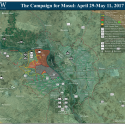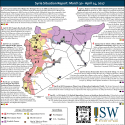The Campaign for Mosul: April 29-May 11, 2017
May 11, 2017 - Patrick Martin
By Jessa Rose Dury-Agri and the ISW Iraq Team

By Jessa Rose Dury-Agri and the ISW Iraq Team

By Alexandra Gutowski and Jessa Rose Dury-Agri

Russia’s campaign against Syrian civilians continued undeterred by the U.S. strike on April 6 in response to the Bashar al-Assad regime’s use of chemical weapons in southern Idlib.
Key Takeaway: Turkey’s President Erdogan is trying to coerce President Trump into shifting American support from Kurdish forces toward Turkey’s proxies in Syria, which include al Qaeda-linked elements. Erdogan may launch a new ground operation into Syria in order to create ground realities that could force the U.S.

Russia, Iran, and Syria demonstrated their enduring partnership during a trilateral foreign ministerial meeting in Moscow on April 14 to discuss their response to the recent strike by the U.S. against Shayrat Airbase in Syria on April 6. Meanwhile, Syrian President Bashar al-Assad continued to consolidate his grip around core regime terrain in Damascus and Hama City.

U.S. President Donald Trump demonstrated a new willingness to use force against the regime after conducting cruise missile strike targeting the Shayrat Airbase in Central Syria on April 6. The strikes came in response to the regime’s use of sarin gas against the opposition-held town of Khan Sheikhoun in Northern Syria on April 4.

The U.S strike against an Assad regime base in northern Syria on April 6, 2017 opened the door to a reorientation of American strategy in the Middle East. President Trump’s action could reset the terms of America’s confrontation of other hostile states, such as North Korea. President Trump may be shifting away from a narrow focus on the Islamic State of Iraq and al Sham (ISIS) as the strategic priority in Syria and toward a new approach.

By: Chris Kozak, Genevieve Casagrande, and Tom Ramage
Pro-regime basing data accurate through March 21, 2017. Syria Control of Terrain data accurate through April 3, 2017.

Al-Qaeda resumed large-scale offensive operations against the regime following a consolidation phase in Northern Syria. The U.S. accelerated its campaign to isolate and seize Ar-Raqqa City alongside the Syrian Kurdish YPG.